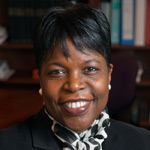 Elmira Mangum, president of Florida A&M University in Tallahassee, is in the third-year of a three-year contract. Over her tenure, she has had a rocky relationship with the university’s board of trustees. Last year, President Mangum survived an effort to remove her from office with a 7-5 vote of support from the trustees. Some members of the board had questioned spending for improvements at the president’s university-owned residence and the payment of a bonus to a university official.
Elmira Mangum, president of Florida A&M University in Tallahassee, is in the third-year of a three-year contract. Over her tenure, she has had a rocky relationship with the university’s board of trustees. Last year, President Mangum survived an effort to remove her from office with a 7-5 vote of support from the trustees. Some members of the board had questioned spending for improvements at the president’s university-owned residence and the payment of a bonus to a university official.
Recently the board voted – again by a 7-5 margin – not to renew the president’s contract when it expires in April. The board created a task force to determine the future of leadership at the university. It did not rule out extending the president’s contract and it did not rule out letting her go.
Dr. Mangum was named the 11th president of the historically Black educational institution in 2014. She is the first woman to hold the position on a permanent basis. Before being named president. Dr. Mangum was vice president for planning and budget at Cornell University in Ithaca, New York. She also served on the faculty at the Johnson School of Management at Cornell. Earlier in her career, she was senior associate provost at the University of North Carolina at Chapel Hill, vice provost at the University at Buffalo in New York, and operations specialist at the University of Wisconsin at Madison.
Dr. Mangum is a graduate of North Carolina Central University in Durham, North Carolina. She holds two master’s degrees from the University of Wisconsin and a doctorate in educational leadership from the University at Buffalo.


This article is an example of the issues that appear to arise at some institutions that are related to the President of an institution and the Board which is charged with ensuring that the educational mission is achieved. Board oversight is a balance that sometimes becomes out of sync and it does occur at some HBCUs. Not knowing the politics or particulars involved, I will say that Presidents and Boards need to have a common understanding of their respective roles as well as how they should work synergistically in helping students persist and complete their educational and career goals. After all, the ultimate mission of any institution should be its students. If fiscal improprieties are discovered, however, the Board does have the right to question and take action when and where necessary. It is unfortunate that some other priorities get in the way of any institution serving the students who enroll.
Critical thinking: She seems to be qualified for the job. What did she do that’s not reported here that offended the Board? This terse article really needs more information.